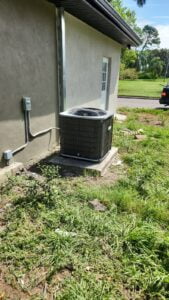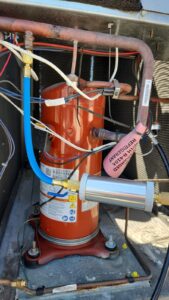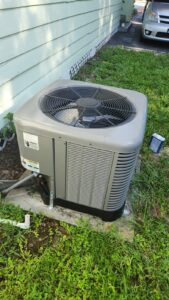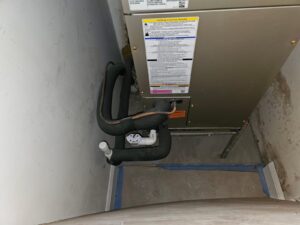Electric Heat vs. Propane for Efficient Home Heating
Choosing the right heating solution for your home is a crucial decision that can impact your comfort, energy costs, and overall living experience. The debate between electric heat and propane heating often leads homeowners to consider a variety of factors, ranging from efficiency and cost to installation requirements and environmental considerations. In this comprehensive exploration, we’ll delve deeper into the key differences between these two heating options to help you make an informed choice that aligns with your needs and preferences.
Energy Source and Conversion Efficiency
Electric Heat: Electric heating systems operate by converting electrical energy into heat through resistance heating elements. This process is highly efficient, as almost 100% of the energy consumed is directly transformed into heat. The result is consistent warmth and precise temperature control throughout your living spaces.
Propane Heating: Propane heaters rely on burning propane gas to generate heat. While propane heating is efficient, some heat loss occurs during the combustion process and through ventilation. As a result, the overall efficiency of propane heating systems is slightly lower than that of electric heating systems.
Cost Considerations and Affordability
Electric Heat: The cost of heating with electricity can vary based on your local energy rates. Generally, electricity is considered a more expensive heating option compared to other fuels like propane. However, the high efficiency of electric heating can contribute to cost savings over time.
Propane Heating: Propane is often a more cost-effective choice for heating, especially in regions where it’s readily available and competitively priced. The relatively lower cost of propane as a fuel source can lead to significant savings on energy bills.
Installation Complexity and Convenience
Electric Heat: Installing electric heating systems is relatively straightforward. These systems do not require the installation of fuel storage tanks or gas lines, simplifying the installation process and potentially reducing upfront costs.
Propane Heating: Installing propane heating systems involves setting up storage tanks and gas lines, which can add complexity and cost to the installation process. Retrofitting an existing home for propane heating may require more extensive modifications to accommodate these components.
Maintenance Requirements and Longevity
Electric Heat: Electric heating systems generally have fewer moving parts, resulting in lower maintenance requirements. Regular cleaning and occasional inspection of electrical components are typically sufficient to maintain the system’s efficiency.
Propane Heating: Propane heaters require more regular maintenance due to the combustion processes involved and the need for proper ventilation. Routine inspections, cleaning, and checks for carbon monoxide emissions are essential to ensure both safety and efficiency.
Environmental Impact and Sustainability
Electric Heat: The environmental impact of electric heat depends on the energy sources powering your local electricity grid. If your electricity is sourced from renewable resources, electric heating can be an environmentally friendly choice. However, if your grid relies heavily on fossil fuels, the environmental benefits may be somewhat diminished.
Propane Heating: While propane is a versatile and efficient fuel, its combustion releases carbon dioxide and other pollutants into the atmosphere. While advancements in propane technology have led to cleaner-burning options, it may not be as environmentally friendly as certain electric heating systems powered by renewable energy sources.
Heating Capacity and Response Time
Electric Heat: Electric heating systems provide consistent and even heat distribution throughout your home. However, they might have a slightly slower response time compared to propane systems, which can be a consideration during rapid temperature fluctuations.
Propane Heating: Propane heaters offer rapid and powerful heat output, making them ideal for quickly warming spaces, especially during cold weather spells or sudden temperature drops.
Fuel Availability and Accessibility
Electric Heat: Electric heat relies on the availability of electricity, which is typically accessible in both urban and rural areas, making it a convenient choice for many homeowners.
Propane Heating: The availability of propane varies based on your geographical location. In rural areas, propane might be more accessible, making it a feasible option for heating in regions where other energy sources might be limited.

Geographic Considerations:
The choice between gas and electric HVAC systems can be influenced by your geographic location. Natural gas may be readily available in some areas but unavailable or cost-prohibitive in others. In regions with access to abundant and affordable natural gas, gas heating may be the preferred choice.
The decision between electric heat and propane heating is multifaceted, and various factors must be considered before making a choice. Factors such as efficiency, cost, installation complexity, maintenance requirements, environmental impact, and local considerations all play a role in determining which option aligns best with your preferences and needs. Carefully assess your unique circumstances, including the size and layout of your home, your budget, and your energy priorities. By understanding these key differences, you’ll be better equipped to select the heating solution that provides optimal comfort, energy efficiency, and peace of mind for you and your family.

Differences and Similarities of Electric Heat and Propane Heat
Selecting the right heating system for your home is a significant decision, and understanding the differences and similarities between electric heat and propane heat is crucial to making an informed choice. Let’s explore these two heating options in detail.
Differences:
Energy Source:
- Electric Heat: Electric heating systems rely on electricity as their energy source, converting it into heat through resistance heating elements.
- Propane Heat: Propane heating systems use propane gas as a fuel source, which is burned to produce heat.
Efficiency:
- Electric Heat: Electric heaters are highly efficient, converting almost all the energy they consume into heat. This results in precise temperature control and even heating.
- Propane Heat: Propane heaters are efficient but may experience some heat loss through the combustion process and ventilation, making them slightly less efficient than electric heaters.
Cost:
- Electric Heat: The cost of electricity can vary depending on local rates, but it is often considered more expensive than propane on average.
- Propane Heat: Propane is typically more cost-effective for heating, especially in areas where it’s readily available and competitively priced.
Installation:
- Electric Heat: Electric heating systems are easier to install since they don’t require fuel storage tanks or gas lines, making the installation process simpler.
- Propane Heat: Propane heating systems require the installation of propane storage tanks and gas lines, which can add complexity and cost to the installation process, particularly in retrofitting existing homes.
Maintenance:
- Electric Heat: Electric heaters have fewer moving parts, resulting in lower maintenance requirements. Regular cleaning and occasional component inspections are typically sufficient.
- Propane Heat: Propane heaters require more regular maintenance due to the combustion processes involved and the need for proper ventilation. Regular inspections and cleaning are essential for safety and efficiency.
Environmental Impact:
- Electric Heat: The environmental impact depends on the energy sources powering the local electricity grid. If sourced from renewables, electric heating can be eco-friendly.
- Propane Heat: Propane combustion releases carbon dioxide and other pollutants into the atmosphere, making it less environmentally friendly, though advancements in technology have led to cleaner-burning options.
Heating Capacity:
- Electric Heat: Electric heating systems provide consistent and even heat distribution but may have a slightly slower response time.
- Propane Heat: Propane heaters offer rapid and powerful heat output, making them ideal for quickly warming spaces, especially during temperature drops.
Similarities:
- Heating Function: Both electric and propane heating systems serve the primary function of providing warmth and maintaining comfortable indoor temperatures.
- Availability: In most areas, both electric and propane heating options are accessible, making them viable choices for homeowners.
- Temperature Control: Both systems allow for precise temperature control, allowing you to set and maintain your desired comfort level.
- Heating Zones: Both electric and propane systems can be configured for heating specific zones or areas within your home, providing flexibility in heating control.
- Safety: Both heating options come with safety considerations, and proper maintenance and adherence to safety guidelines are essential for safe operation.
In summary, electric heat and propane heat differ in terms of energy source, efficiency, cost, installation, maintenance, and environmental impact. While propane is often more cost-effective, electric heat offers high efficiency and may be more environmentally friendly, depending on the energy grid. Ultimately, the choice between the two depends on your specific needs, budget, and environmental priorities.

Is gas or electricity better for HVAC?
Are electric heaters more efficient than propane?
Electric heaters are generally considered more efficient than propane heaters in terms of converting energy into heat. This efficiency is primarily due to the way each type of heater operates.
Electric Heaters:
- Electric heaters convert nearly 100% of the electricity they consume into heat. There is minimal energy loss in this process, resulting in highly efficient heating.
- They provide precise temperature control and even heating, making them an efficient choice for maintaining a consistent indoor climate.
Propane Heaters:
- Propane heaters burn propane gas to generate heat. While they are still considered efficient, some heat is lost through the combustion process and ventilation, reducing overall efficiency compared to electric heaters.
- Propane heaters may experience heat loss due to the need for proper ventilation, which can impact their efficiency.
However, it’s important to note that efficiency isn’t the only factor to consider when choosing between electric and propane heaters. Other factors such as fuel availability, installation costs, maintenance requirements, and environmental impact also play a crucial role in the decision-making process. The choice between the two types of heaters should be based on a comprehensive assessment of your specific heating needs and priorities.
Are there significant differences in maintenance needs and costs between the two types of systems?
Yes, there are typically differences in maintenance needs and costs between gas and electric HVAC (heating, ventilation, and air conditioning) systems. Here’s a breakdown of these differences:
Gas HVAC Systems:
- Maintenance Needs: Gas heating systems, such as gas furnaces, tend to have more complex maintenance requirements compared to electric systems. This is because they involve combustion processes and have more components that require regular inspection and servicing.
- Maintenance Costs: Maintenance for gas systems can be more expensive due to the need for specialized technicians who are trained to work with gas appliances. Routine maintenance includes cleaning burners, checking for gas leaks, inspecting heat exchangers, and ensuring proper ventilation. It may also involve safety checks for carbon monoxide emissions.
- Frequency: Gas systems typically require annual maintenance to ensure safe and efficient operation. This regular servicing helps prevent breakdowns and ensures that the system is operating at peak efficiency.
Electric HVAC Systems:
- Maintenance Needs: Electric heating and cooling systems, such as heat pumps or electric furnaces, tend to have fewer moving parts and simpler mechanisms. As a result, they generally have lower maintenance needs compared to gas systems.
- Maintenance Costs: Maintenance for electric systems is often more affordable since there are fewer components to inspect and service. Routine maintenance usually involves cleaning filters, checking electrical connections, and ensuring proper airflow.
- Frequency: Electric HVAC systems also benefit from annual maintenance, which can help extend their lifespan and maintain their efficiency. However, the maintenance tasks are typically less involved compared to gas systems.
In summary, gas HVAC systems typically have more complex maintenance requirements and higher maintenance costs due to the combustion processes and safety considerations involved. Electric HVAC systems, on the other hand, are generally simpler to maintain and have lower associated maintenance costs. Regular maintenance for both types of systems is essential to ensure safe and efficient operation, prevent breakdowns, and prolong the lifespan of the equipment.
Do you need to make any modifications to your home’s infrastructure to accommodate a gas or electric HVAC system?
Yes, whether you need to make modifications to your home’s infrastructure to accommodate a gas or electric HVAC (Heating, Ventilation, and Air Conditioning) system can depend on several factors, including your existing setup and the choice of an HVAC system. Here are some considerations for both types:
Gas HVAC System:
- Gas Line: If you’re installing a gas furnace or other gas-based heating system, you’ll need a gas line running to the unit. If your home doesn’t already have a gas line in place, you’ll need to have one installed, which can involve trenching and connecting to your home’s gas supply.
- Ventilation: Gas heating systems require proper ventilation to safely remove combustion byproducts like carbon monoxide. Depending on your home’s layout and the location of the HVAC system, you may need to install vents or a flue system to facilitate this.
- Space Requirements: Gas furnaces and boilers may require more space than electric heating systems due to the combustion chamber and venting requirements. Ensure you have adequate space in your utility area or wherever the HVAC system will be located.
- Safety Measures: Gas HVAC systems come with safety considerations. You may need to install carbon monoxide detectors and ensure proper gas shutoff valves and emergency procedures are in place.
Electric HVAC System:
- Electrical Supply: Electric HVAC systems require a dedicated electrical circuit with the appropriate voltage and amperage. You may need to upgrade your electrical panel or circuits to accommodate the system’s power requirements.
- Airflow: Ensure that the HVAC system’s airflow needs are met. This may involve modifying existing ductwork or installing new ducts if they are not already in place.
- Space Requirements: Electric heating and cooling systems often require less physical space compared to gas systems, but you should still ensure that the chosen system fits comfortably in your designated installation area.
- Voltage Compatibility: Confirm that your home’s electrical system is compatible with the voltage and phase requirements of the electric HVAC system you plan to install.
- Thermostat Compatibility: Ensure that your existing thermostat or the one you plan to install is compatible with the electric HVAC system, as different systems may require specific thermostat types.
- Insulation and Energy Efficiency: Electric systems may benefit from improved insulation and energy-efficient windows and doors to reduce heating and cooling costs.
In both cases, it’s crucial to consult with HVAC professionals who can assess your specific situation, recommend appropriate modifications, and ensure that your chosen HVAC system is safely and efficiently integrated into your home. Modifying your home’s infrastructure to accommodate a new HVAC system should be done by qualified professionals to ensure safety and compliance with local building codes and regulations.
Making the Right Choice: Gas vs. Electric Heating with The AC Therapist
In conclusion, the choice between gas and electric air conditioners and heating systems is a crucial decision that impacts your comfort, energy efficiency, and budget. Both options have their merits, but the right one for you depends on your unique circumstances and priorities.
At The AC Therapist, we’re not just your local HVAC experts; we’re your partners in achieving the perfect climate in your home. Our heating services cater to a wide range of needs, whether you opt for gas or electric systems. We offer installation, maintenance, and expert advice to ensure your HVAC system operates efficiently and reliably throughout the seasons.
When making your decision, consider factors like cost, efficiency, environmental impact, and your home’s existing infrastructure. Our team at The AC Therapist is always ready to assist you in making the right choice for your heating and cooling needs. Whether you choose gas or electric, we’re here to ensure your home remains comfortable and cozy year-round.









